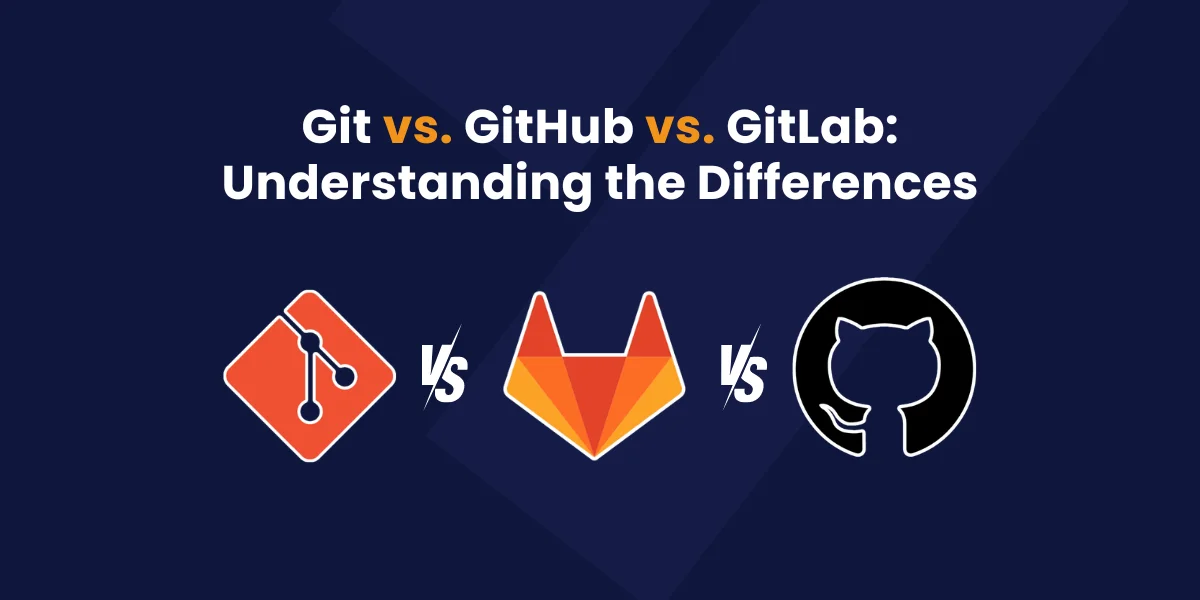Understanding Git, GitHub, and GitLab

In the ever-evolving world of software development, version control is a fundamental skill that every developer should master. Among the tools available, Git, GitHub, and GitLab stand out as essential components in the modern development workflow. Whether you’re a beginner or looking to refine your skills, understanding these tools and their relationships is crucial. At Madros Technologies, we’re here to break down what Git, GitHub, and GitLab are, how they relate to one another, and the key differences that set them apart.
What is Git?
Git is a distributed version control system that allows developers to track changes in their code and collaborate on projects efficiently. Created by Linus Torvalds in 2005, Git has become the industry standard for version control due to its speed, flexibility, and robustness.
Key Features of Git:
- Version Tracking: Git records changes to files over time, allowing you to revert to previous versions if needed.
- Branching and Merging: Developers can create branches to work on new features or fixes without affecting the main codebase. Once the work is complete, branches can be merged back into the main branch.
- Distributed Architecture: Each developer has a local copy of the entire repository, making it easy to work offline and collaborate with others.
Why Use Git?
Using Git helps developers manage their code more effectively, reduces the risk of conflicts, and enhances collaboration. It’s an essential tool for both individual projects and team-based development.
What is GitHub?
GitHub is a web-based platform that uses Git for version control and provides a collaborative environment for developers. Launched in 2008, GitHub has become the largest host of source code in the world, making it a go-to resource for developers to share and collaborate on projects.
Key Features of GitHub:
- Repositories: GitHub allows users to create repositories where they can store and manage their code. Each repository can be public or private, depending on the desired level of access.
- Pull Requests: GitHub’s pull request feature enables developers to propose changes to a project, facilitating code review and collaboration.
- Issue Tracking: GitHub provides tools for tracking bugs and feature requests, making it easier to manage project tasks.
Why Use GitHub?
GitHub not only simplifies the process of using Git but also offers a social aspect to coding, allowing developers to connect, share knowledge, and contribute to open-source projects. It’s an invaluable resource for building a portfolio and gaining visibility in the developer community.
What is GitLab?
GitLab is another web-based platform that provides Git repository management and CI/CD (Continuous Integration/Continuous Deployment) capabilities. Founded in 2011, GitLab aims to offer a complete DevOps lifecycle tool, integrating version control, project management, and automation.
Key Features of GitLab:
- Integrated CI/CD: GitLab includes built-in CI/CD tools that automate the testing and deployment of code, streamlining the development process.
- Project Management Tools: GitLab provides features like issue tracking, milestones, and burndown charts, helping teams manage their projects effectively.
- Self-Hosted Options: Unlike GitHub, GitLab offers self-hosting capabilities, allowing organizations to run their own instances for enhanced security and control.
Why Use GitLab?
GitLab is ideal for teams looking for a comprehensive solution that combines version control with project management and CI/CD. Its flexibility and extensive features make it a popular choice among organizations of all sizes.
The Relationships Between Git, GitHub, and GitLab
Understanding the relationship between these three tools is essential for effectively leveraging them in your development workflow:
- Git as the Foundation: Git is the underlying version control system that powers both GitHub and GitLab. It provides the core functionalities for tracking changes and managing code.
- GitHub and GitLab as Platforms: Both GitHub and GitLab are platforms that utilize Git to provide additional features and collaborative tools. While they serve similar purposes, they have unique offerings that cater to different user needs.
- Collaboration and Integration: Developers use Git to manage their code locally and then push their changes to either GitHub or GitLab for collaboration with others. Both platforms support various integrations with third-party tools, enhancing the development experience.
Key Differences Between GitHub and GitLab
While GitHub and GitLab share many similarities, they also have distinct differences that may influence your choice of platform:
When comparing GitHub and GitLab, it’s important to understand their primary focus. GitHub is primarily centered around code hosting and collaboration, making it an ideal platform for developers looking to share and work on projects together. In contrast, GitLab takes a broader approach, focusing on complete DevOps lifecycle management. This means that GitLab encompasses not just version control, but also project management and CI/CD (Continuous Integration/Continuous Deployment) capabilities.
Speaking of CI/CD, GitHub offers integration through GitHub Actions, allowing developers to automate their workflows. On the other hand, GitLab provides built-in CI/CD capabilities, which are seamlessly integrated into the platform, streamlining the development process from code to deployment.
Another significant difference lies in self-hosting options. GitHub has limited self-hosting capabilities, which may not suit all organizations. In contrast, GitLab offers full self-hosting capabilities, allowing organizations to run their own instances for enhanced security and control over their code.
User interface is also a point of distinction. GitHub is known for its simple and user-friendly interface, making it easy for newcomers to navigate and use. GitLab, while more complex, is feature-rich, providing a wide array of tools for developers who need them.
Finally, when it comes to pricing, GitHub offers free access for public repositories, with paid plans available for private repositories. GitLab, however, provides a free tier that includes comprehensive features, along with paid plans for those seeking advanced functionalities.
Getting Started with Git, GitHub, and GitLab
Now that you have a clearer understanding of Git, GitHub, and GitLab, it’s time to put your knowledge into practice. At Madros Technologies, we offer a variety of courses designed to help you master these essential tools and enhance your development skills.
Learn and Earn Your Professional Certification
Investing in your education is a smart move for your career. By earning a professional certification from Madros Technologies, you’ll gain valuable skills that will set you apart in the competitive tech industry.
Are you ready to take your coding skills to the next level? Check our courses here and find the perfect course to kickstart your journey in software development!
Conclusion
Understanding Git, GitHub, and GitLab is crucial for anyone looking to succeed in software development. By mastering these tools, you’ll be well-equipped to manage your code effectively, collaborate with others, and streamline your development process.
At Madros Technologies, we’re committed to helping you succeed in your tech career. Explore our courses, earn your certification, and become a confident developer ready to tackle the challenges of the digital world. Your journey starts now!
If you found this content useful, please do well to share:
Blog Search
Latest Posts

Unlocking Your Migration Dreams: From Osun Tech Space to Global Spaces
October 13, 2025Gain visa insights, tech skills, & funding for global success. Join Our Webinar with VESTI on October 18th and unlock your migration dreams for a global fut

Unlock Your Tech Future: Seize a 30% Discount on Professional Tech Courses at Madros Technologies!
September 6, 2025Ready for a career change? Madros Technologies offers 30% OFF expert-led tech training. Master in-demand skills like Software Engineering, Digital Marketing, Da

Quick Window Offer: Extended August Discount Offer – Your Tech Dreams, 40% Off!
August 12, 2025Transform your future with 40% off Madros Technologies courses! Gain job-ready skills in coding, design, and digital marketing fields. This is an extended disco

Your Tech Dream: Closer Than You Think (And Half Off!)
July 5, 2025Unlock your tech potential with Madros Technologies! Get 50% off cutting-edge courses & transform your future. Your dream career starts here.

Using Figma: Tutorial for Beginner Product Designers
June 7, 2025A beginner’s walkthrough of Figma for prototyping and design collaboration

Top 5 Video Editing Software for Beginners
June 7, 2025Discover the best tools for newbie editors to create stunning videos easily
